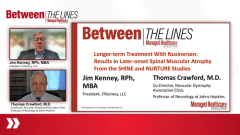
Examining Key Findings from NURTURE Study
Thomas Crawford, MD, discusses exciting new findings from the pivotal NURTURE study.
Episodes in this series

This is a video synopsis/ summary of a Between the Lines featuring Thomas Crawford, M.D.; and Jim Kenney, R.Ph., MBA.
Crawford discusses the main results from the NURTURE study, in which 15 babies with spinal muscular atrophy (SMA) who likely would have died without treatment were all alive, walking and reaching developmental milestones after receiving nusinersen. Some experienced early respiratory difficulties requiring bilevel positive airway pressure and other supports but recovered. Of the babies with two SMN2 gene copies, all 15 could sit independently and 14 could walk with or without assistance. The 3 babies with three copies showed normal development.
The studies of later SMA therapies like onasemnogene abeparvovec (Zolgensma) and risdiplam (Evrysdi) were able to implement more selective enrollment criteria since survival did not depend on enrollment. When the NURTURE study data is filtered using these newer criteria, outcomes remain similar across groups. However, those with two copies may not reach fully normal strength and function.
Key takeaways include the importance of early treatment, enabled by universal newborn screening. Quick diagnosis and approval for therapy is critical to efficacy. While study limitations existed early on, the dramatic differences pre- and post-treatment establish effectiveness. Ongoing work aims to further optimize long-term outcomes.
Video synopsis is AI-generated and reviewed by Managed Healthcare Executive® editorial staff.
Newsletter
Get the latest industry news, event updates, and more from Managed healthcare Executive.





















